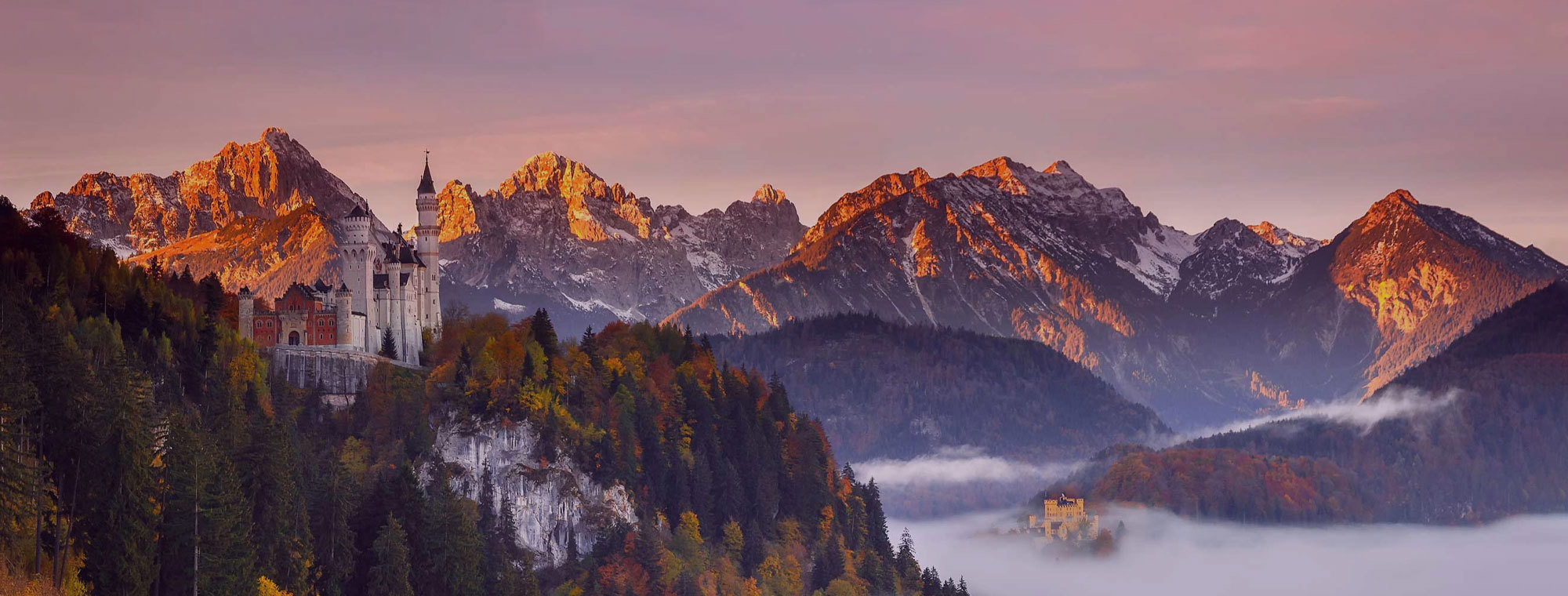Germany Tours & Packages

Write your own storybook ending on one of our 8 - 25 day German tours by exploring the fairy-tale castle of Neuschwanstein, walking the stalls of quintessential European Christmas Markets, or raising a stein of frothy beer at the Hofbräuhaus. Prost!
Germany Tours by Region
A visit to Germany delivers the European experience you’ve dreamed of: castles clinging to wooded mountaintops, grand cathedrals, riverside vineyards, sidewalk cafes on cobbled streets, and more. Savor the contrast of contemporary art and architecture with buildings and neighborhoods that have endured for hundreds of years. From picturesque villages to cosmopolitan cities, Germany will meet your appetite for adventure, history, culture, and fine cuisine. (All washed down with world-class beer and wine, of course!) Book one of our tours of Germany in the summer, and enjoy long days exploring this fascinating country's forests, towns, and cities. Take your Germany vacation in early winter, and visit the magical Christmas markets where you can sample local specialties and confections and shop a tempting array of handicrafts. Or experience Germany via a Rhine River cruise, castle-spotting from the comfort of your vessel’s deck as you drift past historic towns and bucolic farmland. From the cultural riches of the big cities to the natural wonders of the Bavarian Alps and the Black Forest, Germany offers something marvelous every way you turn.
Southern Germany & Bavaria
Southern Germany is a forested wonderland punctuated by old-world cities, picturesque villages, and captivating castles. In southeast Germany lies Bavaria, the largest state in Germany, where the world-famous Oktoberfest is celebrated each fall in Munich, the state capital. Lively beer halls beckon all year round – don’t miss Hofbräuhaus, dating from 1589 and the most famous. Munich is rich with attractions, including the Rathaus Glockenspiel, an elaborate clockwork display on the town hall, and the Munich Residenz, Germany's largest urban palace and former seat of Bavarian royalty. Wander Nuremberg’s cobbled streets, where castle ramparts and Gothic architecture evoke centuries past, visit the Christmas market if your timing is right. Just south, the Franconian Lake District attracts visitors for summer sailing and swimming. Overlooking the beautiful Bavarian forest, the Bavarian Alps, adjacent to Austria, are an international skiing and hiking destination. Enjoy stunning alpine views from the fairytale Neuschwanstein Castle. The woodlands stretch westward, where the mountainous Black Forest inspired the renowned Brothers Grimm fairytales. Prepare to be enchanted by farmhouses and fields, castles, and cuckoo clocks.
Eastern Germany
On your tour of Eastern Germany, encounter Berlin, one of Europe’s most vibrant cities. A UNESCO “City of Design,” Berlin hums with creative energy. Enjoy cafes, restaurants, glittering nightlife, and the Tiergarten, an expansive city park. You’ll also come face-to-face with the once-divided city’s turbulent history by visiting remnants of the Berlin Wall, Checkpoint Charlie, and landmarks of Berlin's East and West sections. From atop the Berlin TV Tower, marvel at the 360-degree views of the now-unified, modernized city. Back on the streets, you’ll see relics of history, including the Baroque cathedral, the neo-Baroque Reichstag building, and the Brandenburg Gate, an iconic 18th-century military monument. You’ll also see modern, cutting-edge architecture, edgy street art, and contemporary boutiques, and winter visitors can visit dozens of Christmas Markets. Just two hours south lies elegant Dresden, a city rebuilt following devastating bombing during WWII, dotted with gorgeous Baroque facades. Visit the Zwinger Palace and Semper Opera house and the fully reconstructed Frauenkirche with one of the largest domes in Europe. Dresden hosts the world’s oldest Christmas market, dating back to 1434.
Central German Metropolitan Region
Central Germany is a metropolitan crossroads of commerce and history. Frankfurt's nickname is “Mainhattan,” referring to the Main River on which it lies and the dynamic skyline of this high-powered business hub. High-rises may dominate the views, but the city retains its historical flavor in the medieval center, where half-timber buildings and charming taverns line cobble-stone lanes. More medieval architecture beckons at the Rothenburg ob der Tauber, a fortified city east of Frankfurt. Once larger than Frankfurt and Munich, Rothenburg is encircled by an intact 14th-century wall with gates and towers and has a renowned seasonal Christmas market. West of Frankfurt, visit the Gutenberg Museum in Mainz, located at the juncture of the Rhine and Main rivers. Named after Johannes Gutenberg, the inventor of movable metal type, this museum about printing honors one of civilization’s landmark innovations. Right across the street, admire the massive red sandstone St. Martin’s Cathedral, a thousand years old. This Romanesque marvel is near the market square and is perfect for people-watching over coffee.
Western Germany & The Rhine Valley
In Western Germany, the Rhine River flows through scenic valleys dotted with terraced hillside vineyards, then passes through the dynamic metropolises of Cologne and Düsseldorf. Weaving through quaint towns and bucolic farmland, the Rhine River gazes up at a series of castles dramatically perched above – some in ruins, some housing museums, hotels, or restaurants. The Moselle Valley and the Moselle River, a tributary to the mighty Rhine, offer still more storybook castles, charming towns, spectacular vistas, and wine-tasting opportunities. This area is highly regarded for its white wines and Riesling grapes. After the gorgeous countryside of Rhineland, set your sights on the urban rewards of Cologne and Düsseldorf. The must-see High Gothic Cologne Cathedral is the tallest twin-spired church in the world at 515 feet and is a UNESCO World Heritage Site. View the river and the old town center from a viewing platform on the south tower. Explore the Altstadt (old town) and see artifacts and ruins dating back to the Romans. Just north lies Düsseldorf, Germany’s capital of fashion and art, where galleries and elegant boutiques ensure world-class window shopping. Both Düsseldorf and Cologne host Christmas markets.
Frequently Asked Questions About Germany Tours
What is the best month to visit Germany?
The summer months offer long days to enjoy the fantastic scenery and the warmest, driest weather. If you crave the Christmas markets, the ideal travel time is December before Christmas, although some markets stay open before and after this period. Celebrate Oktoberfest festivities during the last couple weeks of September into early October.
How many days do you need to see Germany?
A country with rich history and architecture has a lifetime of attractions. To explore the whole country, try to book at least 8-10 days. You can also see several countries by booking a river cruise on the Rhine or Danube Rivers.
What are the best cities in Germany to visit?
Munich is sure to please. Its iconic Hofbräuhaus is a lively year-round attraction, and the glockenspiel is positively enchanting. Visit Frankfurt for a beguiling combination of modern urban culture and historic architecture. Hamburg is an inland port city crisscrossed by a network of canals reflecting stately 19th-century brick buildings.
What currency is used in Germany?
The currency used in Germany is the Euro (€ / EUR). While credit cards are widely accepted in major cities and tourist areas, carrying some cash is recommended for smaller towns and markets.
What voltage do they use in Germany?
Germany uses a 230-volt electrical system with a frequency of 50 Hz. The standard plug type is Type F (also known as Schuko), which has two round prongs. Type C plugs, which also have two round prongs, are commonly used as well. If you’re traveling from a country with a different voltage (e.g., the U.S., which uses 120V), you may need a voltage converter for certain devices, although most modern electronics like phone chargers and laptops are dual-voltage and only require a plug adapter.
Is English widely spoken in Germany?
Yes, English is widely spoken in Germany, especially in major cities like Berlin, Munich, Frankfurt, and Hamburg, but knowing some German phrases can enhance your experience. Learning a few basic phrases like "Sprechen Sie Englisch?" (Do you speak English?) or "Danke" (Thank you) can be helpful and appreciated.
What should I pack for my trip to Germany?
Packing depends on the season and destination, but general travel essentials include comfortable clothing, good walking shoes, a power adapter, weather-appropriate attire, and attire appropriate for visiting religious sites, which can also double as a nice outfit for a night out! For more tips, visit our guide on What to Pack for a Guided Tour.
What should I wear when visiting religious or cultural sites?
Certain sites have dress codes, such as covering shoulders and knees. For a detailed guide, check What to Wear When Visiting Religious Sites.
Do I need a visa to travel to Germany?
Visa requirements vary by country and nationality. U.S. travelers can check the latest visa and entry regulations with our easy-to-use Visa and Passport Requirements Tool.
Should I exchange money before I go to Germany?
Most destinations accept major credit cards, but having some local currency can be helpful for small purchases. Learn more about exchanging money in our Guide to Currency Exchange and Payments While Traveling.
How much should I tip in Germany?
Tipping customs vary by destination. To avoid confusion, check our comprehensive Tipping Guide for International Travel.
What are some important cultural customs to be aware of?
Understanding local etiquette can enhance your experience. Read our Guide to Cultural Customs and Etiquette Abroad.
Is travel insurance necessary for a trip to Germany?
Travel insurance provides peace of mind for unexpected situations like trip cancellations or medical emergencies. Learn why it’s recommended in our Travel Insurance Guide.
How do I stay connected while traveling in Germany?
Many destinations offer Wi-Fi, but you may need a local SIM card or an international phone plan. For more details, visit our guide on How to Stay Connected While Traveling.
Are there any safety tips I should follow when traveling in Germany?
Staying aware of your surroundings and keeping valuables secure is always wise. Read our Essential Safety Tips for Travelers.
How many months in advance should I plan a trip to Germany?
We recommend you plan your Germany trip between 4 -10 months before you want to travel. Airlines don’t publish fares much further out than 10-11 months. Off-peak (April–May, October–November), you can book for better deals 3–6 months in advance. Luckily, we take care of all of that for you! If travelers want to go for a special anniversary or event, they’ll call us years ahead of time to book so they know they are set and we're handling the details for them. While we love a great last-minute getaway, always ensure your passport is valid for at least six months after you plan to return to the States. Keep current with country entry restrictions, and ensure you have any visas you’ll need to travel. Planning earlier allows you plenty of time to renew your passport or apply for a visa if required.
Why You Should Travel to Germany
Greece is a dream destination, blending ancient history, stunning landscapes, and vibrant culture. From the iconic Acropolis in Athens to the breathtaking Santorini sunsets, every corner tells a story. Explore crystal-clear beaches, charming whitewashed villages, and world-class cuisine featuring fresh seafood and olive oil. Greek hospitality is legendary, making every visitor feel at home. Wander through ancient ruins and scenic trails, or sail the Aegean’s turquoise waters. Whether you're drawn to mythology, adventure, or relaxation, Greece offers an unforgettable experience. Its rich traditions, lively festivals, and stunning islands make it a must-visit for any traveler seeking beauty and history. Check out our Frequently Asked Questions about Guided Vacations to learn more.




